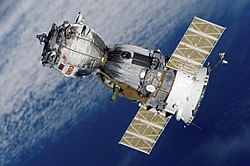 The launch of Soyuz MS-12 | |
| Operator | Roscosmos |
|---|---|
| COSPAR ID | 2019-013A |
| SATCAT no. | 44069 |
| Mission duration | 202d 15h 46m |
| Distance travelled | 86.1 million miles. [1] |
| Orbits completed | 3,248 [2] |
| Spacecraft properties | |
| Spacecraft | Soyuz Spacecraft |
| Spacecraft type | Soyuz-MS 11F747 |
| Manufacturer | Energia |
| Crew | |
| Crew size | 3 |
| Members | Aleksey Ovchinin Nick Hague |
| Launching | Christina Koch |
| Landing | Hazza Al Mansouri |
| Callsign | Burlak [3] |
| Start of mission | |
| Launch date | 14 March 2019, 19:14:08 UTC [4] [5] |
| Rocket | Soyuz-FG |
| Launch site | Baikonur, Pad 1/5 |
| Contractor | RKTs Progress |
| End of mission | |
| Landing date | 3 October 2019, 10:59 UTC [2] |
| Landing site | 47°24'04.44"N, 69°34'14.1"E [2] |
| Orbital parameters | |
| Reference system | Geocentric |
| Regime | Low Earth |
| Inclination | 51.6° [5] |
| Docking with ISS | |
| Docking port | Rassvet nadir |
| Docking date | 15 March 2019, 01:01 UTC [2] |
| Undocking date | 3 October 2019, 07:37 UTC [2] |
| Time docked | 202d 6h 36m |
 Mission insignia, which incorporated elements from the MS-10 mission insignia  (l-r) Koch, Ovchinin and Hague | |
Soyuz MS-12 was a Soyuz spaceflight that launched on 14 March 2019, carrying three members of the Expedition 59 crew to the International Space Station. [6] The mission ended on 3 October 2019 when Soyuz-MS-12 successfully landed.

